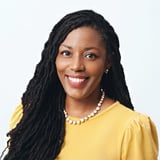Summary
Financially vulnerable Americans rarely get to tell their own stories. Often when decision makers, even the best-intentioned, talk about Americans who are financially stressed, stereotypes riddled with paternalistic judgements frame the conversation. Some researchers are even reluctant to visit people in what they deem “rough neighborhoods”. In the absence of real people telling their own stories, biased judgements take root. Yasmine will speak about best practices for conducting fruitful unbiased studies with people who are financially vulnerable. She’ll also share key insights gained over 4 years that debunk stereotypes about financially vulnerable Americans and the myth of “pulling yourself up by your bootstraps.”
Key Insights
-
•
Financial insecurity is primarily caused by lack of money, not lack of money management skills.
-
•
People struggling financially are often meticulous about tracking their expenses, spending hours weekly managing their budgets.
-
•
Stagnant wages, rising costs of living, and precarious work schedules exacerbate financial vulnerability despite individuals' efforts.
-
•
Paternalistic stereotypes and misguided judgments from decision makers harm policy and funding critical to those in need.
-
•
Qualitative research reveals financial struggles’ emotional and cognitive toll, showing complexity beyond quantitative data.
-
•
Culturally specific financial behaviors, such as black tax and reliance on family lending, must be considered for accurate insights.
-
•
Researchers must be comfortable facilitating uncomfortable conversations and establish trust to hear authentic stories.
-
•
Financial Health Network’s 8-question financial health score is a better participant screening tool than income alone.
-
•
FinTech often over-focuses on money management tools rather than addressing systemic financial scarcity and institutional accountability.
-
•
Flexibility in participant scheduling is crucial when working with hourly workers with unpredictable and critical shifts.
Notable Quotes
"Money management itself is not the primary problem because you can't manage something that's just not there."
"People who are struggling are constantly battling an unstable financial situation, which comes with a high cognitive and emotional energy cost."
"Paternalistic judgments from lawmakers can be tangibly harmful, leading to lack of funding for basic services and policies."
"Even those with a roof over their head didn’t really fare much better; unexpected expenses break the budget every time."
"The financial health network found that 72% of the population is either coping or vulnerable financially."
"You need to be just as careful conducting interviews in Beverly Hills as in poorer neighborhoods; wealth does not guarantee safety."
"When you allow people to share their story, it's not just sharing to share; it's to contribute to better products, policies, and services."
"Avoid leading questions and adjectives so participants use their own words and reveal true values and feelings about money."
"People put stressful topics like money at the back of their head, so self-reported surveys on money stress are often inaccurate."
"Being extra flexible with scheduling and logistics leads to richer, more authentic insights from participants living paycheck to paycheck."
Or choose a question:
















More Videos

"Accessibility isn’t a checkbox you run automated tests for; you must involve people with disabilities to benchmark success."
Sam ProulxOnline Shopping: Designing an Accessible Experience
June 7, 2023

"We built a career path to make evaluations as fair and consistent as possible across roles."
Ignacio MartinezFair and Effective Designer Evaluation
September 25, 2024

"The pod system gave leads more credibility and leadership opportunities while supporting junior growth."
Sarah Kinkade Mariana Ortiz-ReyesDesign Management Models in the Face of Transformation
June 8, 2022

"Design is often framed as problem solving, but conversation is a better framework to respect users as active experts."
Daniel GloydWarming the User Experience: Lessons from America's first and most radical human-centered designers
May 9, 2024

"We spend millions on content that nobody wanted and that didn’t actually help people navigate their lives."
Patrick BoehlerFishing for Real Needs: Reimagining Journalism Needs with AI
June 10, 2025

"AI-moderated interviews will help drill down on depth without sacrificing scalability or requiring scheduling moderators."
Andy Barraclough Betsy NelsonFrom Costly Complexity to Efficient Insights: Why UX Teams Are Switching To Voxpopme
September 23, 2024

"I’m totally freaked out by facial recognition and wonder why we don’t get together as consumers to push back on bad designs."
Alexandra SchmidtWhy Ethics Can't Save Tech
November 18, 2022

"In government, the motivation is reduction of misery: why are we up at 3 AM fixing something avoidable?"
Louis RosenfeldDiscussion: What Operations can teach DesignOps
November 6, 2017

"Design systems are the language of implementation; they allow us to communicate ideas in a common format and process."
Mitchell BernsteinOrganizing Chaos: How IBM is Defining Design Systems with Sketch for an Ever-Changing AI Landscape
September 29, 2021
















